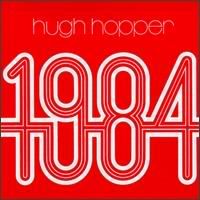
CBS, 1973; reissued by Cuneiform; available
Cuneiform CD: 7 tracks, 48:04
The late (and greatly missed) Hugh Hopper's first solo release, 1984 is in many ways one of his boldest and most fascinating works. This was a period when Soft Machine was devolving into basic jazz-rock; Robert Wyatt had already departed, and Hopper would depart himself the same year 1984 was released. According to Hopper's liner notes, CBS was enthusiastic about his solo album until they heard the music, forcing Hugh to take out a bank loan to produce it. Then again, a loose instrumental concept album about the Orwell novel does seem like a strange commercial prospect. Truth be told, calling it a solo album is slightly misleading; on most tracks Hopper is accompanied by a truly great choice of players, ranging from Pye Hastings and Gary Windo to Lol Coxhill and John Marshall. All of the tracks take their names from the ministries in the novel. The four shorter pieces are fairly accessible, with "Minipax I" being the most traditional-sounding thing on here. "Minipax II" has backwards and sped-up trombones in the mix, along with Hopper playing comb and paper, while both "Minitrue" and "Minitrue Reprise" are atmospheric miniatures. The two long tracks are probably what made the label nervous. "Miniluv" finds Hopper truly solo for nearly fifteen minutes. Obviously influenced by Terry Riley (he admits it in the liners), this is a moody loop-based piece for bass, percussion, and mellophone. Constantly shifting and twisting over its length, this is a natural progression from Hopper's experimental Soft Machine contributions. Good luck figuring out what instrument is making which sound! "Miniplenty" is just over seventeen minutes long, and it finds Hopper and Marshall exploring similar experimental terrain. This time, Hopper's heavily modified voice and what sounds like bells accompany his bass playing, which truly sounds not a jot like a bass for the majority of both extended tracks. They're excellent examples of dark ambient, and while they contrast with the shorter pieces for the most part, this is a delightfully different experience taken as a whole. The domestic CD reissue has "Miniluv Reprise" as a bonus, which is a shorter and more rock-oriented version of said track featuring an extended lineup. The Japanese CD features further bonus demo material, which I haven't heard.

No comments:
Post a Comment